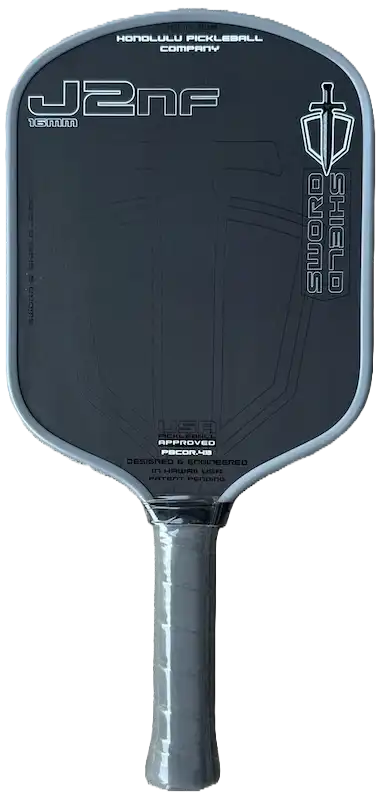TL;DR
- Five shapes (R1-R5) deliver 58.5-59.4 MPH serves and 38.4-38.7 MPH punch volleys at $99 with code MPB
- Stock paddles feel unstable with low twist weights (5.6-6.4) but transform with 15 grams of added weight
- Weighted Quantas perform within touching distance of $333 Selkirk Boomstik for one-third the price
- EPP foam core with EVA rings and TPE inserts creates customization-friendly construction
- Best value in power paddle category for players willing to modify their equipment
Intro
A paddle line that plays like a $200 premium foam paddle but costs under a hundred bucks sounds too good to be true. The Ronbus Quanta series challenges that skepticism, delivering legitimate power performance at $99 with code MPB—but only after you add some weight to unlock its full potential.
The lineup includes five distinct shapes: R1 elongated with curved top, R2 standard widebody, R3 elongated square head, R4 hybrid, and R5 standard with tapered corners. These foam-core power paddles challenge conventional wisdom about what you should expect at the sub-$100 price point for build quality and performance.
Ronbus sent these paddles for testing with no strings attached. The retail price is $119, but code MPB drops them to $99. The central question isn't whether these are good paddles—they're already being called budget paddle of the year territory for pure value. The real question is whether you're willing to do customization work to unlock their full potential, because stock versus weighted, these play like completely different paddles.
This review covers extensive testing of all five shapes both stock and with various weight configurations. The transformation with added weight is remarkable, turning unstable budget paddles into legitimate power competitors that rival equipment costing three times as much.
Tech Overview
The Quanta construction shows thoughtful engineering choices that target specific weaknesses of budget foam paddles. At the core sits full EPP foam throughout—the same material used in high-end paddles like the Selkirk Boomstik, CRBN TruFoam, and Bread & Butter Loco. This isn't honeycomb or polymer core wrapped in foam; it's solid EPP construction.
Surrounding the core is an EVA ring around the top portion of the paddle, designed to enhance power and pop specifically in the hitting zone where most shots make contact. The denser EVA material stores and releases energy more efficiently than foam alone, creating the power boost these paddles are known for.
In the lower throat corners, TPE elastomer pieces provide softer, rubber-like dampening meant to improve stability and reduce vibration. This addresses the twist-weight issues that plague many lightweight paddles, though these inserts need additional help from strategic weight placement to fully solve stability concerns.
The edge construction features carbon fiber grid wrapping around edge foam, plus a carbon-wrapped edge tube at the throat and handle junction. The handle itself uses carbon-wrapped EPP with hard pallets—a significant improvement over the soft, oddly-shaped handles from earlier Ronbus releases.
Face construction uses raw Toray T700 carbon fiber with coarse peel-ply texture providing excellent grit for spin generation. Testing shows spin numbers clustering around 2265-2316 RPM, placing these paddles in the 74th-94th percentile for spin production—solid bite for the price point.
The entire construction is thermoformed rather than compression-molded, fusing edges and face together for a stiffer frame and more durable, seamless finish. Each paddle is USAP certified for tournament play right out of the box.
What makes this tech package interesting is how it seems optimized for customization. The weight distribution and material responsiveness to added weight suggests Ronbus designed these expecting players to modify them rather than play them stock.
Specs
The specifications paint a clear picture of what these paddles prioritize. Static weight falls between 7.61-7.71 ounces across all five shapes, making them extremely light paddles with minimal variation. The R5 hits the lightest at 7.61 ounces while the R4 tops out at 7.71 ounces.
Swing weight demonstrates just how maneuverable these paddles are. The R2 measures 102.2, R5 at 103.45, R4 at 103.85, R1 at 107.7, and R3 at 110.3. Most power paddles fall between 115-125 swing weight, making these featherweight by comparison.
Power testing reveals impressive numbers despite the light construction. Serve speeds range from 58.5-59.4 MPH across shapes, placing them in the 75th-90th percentile for serve speed. Punch volley speeds hit 38.4-38.7 MPH, landing in the 89th-94th percentile for pop. These are legitimate power paddle numbers competing with much more expensive options.
Firepower scores range from 83-90 across the line, with the R3 hitting the highest at 90 and the R4 at 83. When these paddles were announced at $99, the expectation was a control paddle since Ronbus already had the Ripples in power and Refoams as all-court. The actual power performance came as a surprise.
Twist weight reveals the main design weakness. The elongated shapes R1 and R3 both measure 5.6, the R4 hits 5.85, the R2 at 6.4, and the R5 at 6.08. These low numbers across the board mean more paddle twisting and stability issues on off-center hits—the primary reason these paddles need weight modification.
Balance points vary significantly by shape. The R1 at 24.9 cm is head-heavy, trying to compensate for light swing weight but feeling tougher to manage in quick exchanges. The R3 at 24.4 cm is moderately head-heavy but more manageable. The R2, R4, and R5 all balance closer to neutral around 23.8-23.9 cm, making them feel more controlled during fast hand battles.
Dimensionally, the lineup offers real variety. Elongated shapes R1 and R3 stretch to 16.0 and 16.5 inches respectively with 7.5-inch widths. The R4 hybrid compacts to 15.25 inches long by 7.75 inches wide. Widebody options R2 and R5 both measure 16.0 by 8.0 inches.
Handle specifications remain identical across the line: 5.5-inch length with 4.25-inch circumference and improved hard pallets. The grip feels substantially better than earlier paddles like the Ripple Betas.
These measurements create paddles that prioritize maneuverability over stability, expecting players to dial in their preferred feel through strategic weight additions rather than relying on stock configuration.
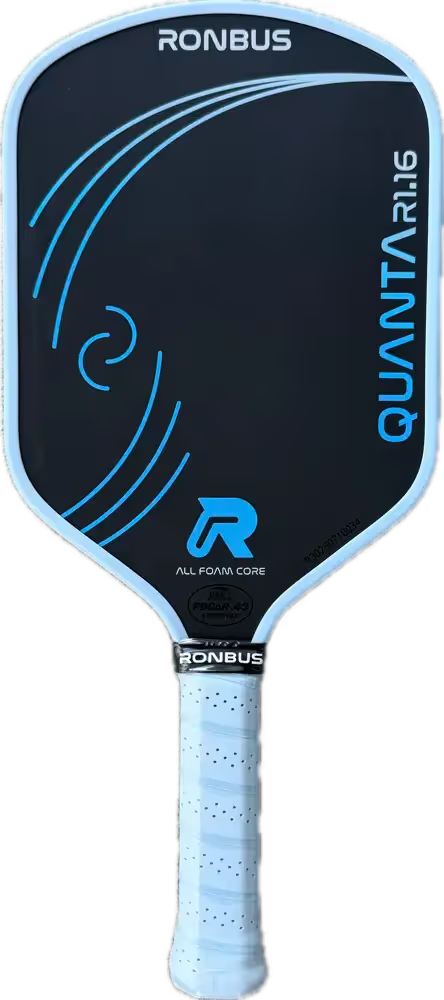
- Control
Best for strategic players who favor precision and placement over power, excelling in slow play and careful ball manipulation. - All-Court
Designed for versatile players who want the best of both worlds. These paddles balance control, power, and speed, adaptable to various playing styles. - Power
Ideal for aggressive players (aka, "bangers") who prioritize fast, powerful gameplay, sacrificing some control and sweet spot size for maximum force.
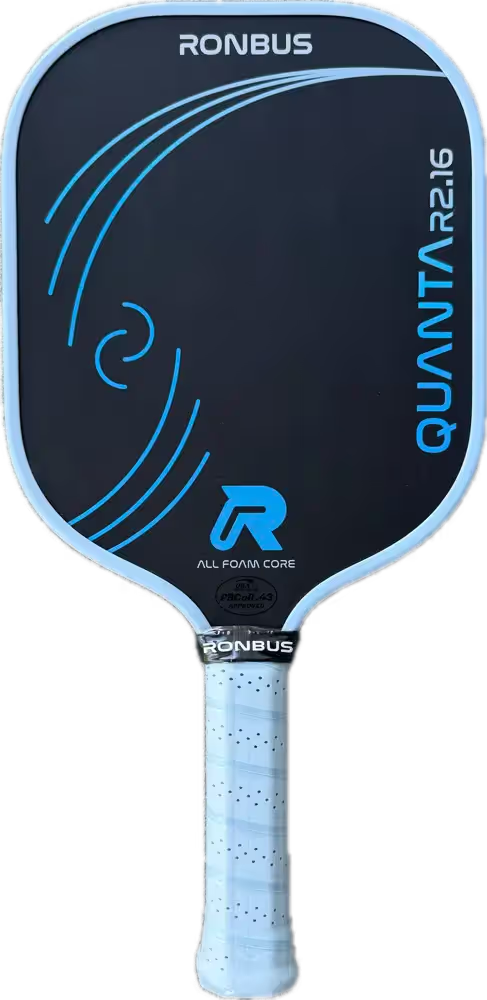
- Control
Best for strategic players who favor precision and placement over power, excelling in slow play and careful ball manipulation. - All-Court
Designed for versatile players who want the best of both worlds. These paddles balance control, power, and speed, adaptable to various playing styles. - Power
Ideal for aggressive players (aka, "bangers") who prioritize fast, powerful gameplay, sacrificing some control and sweet spot size for maximum force.
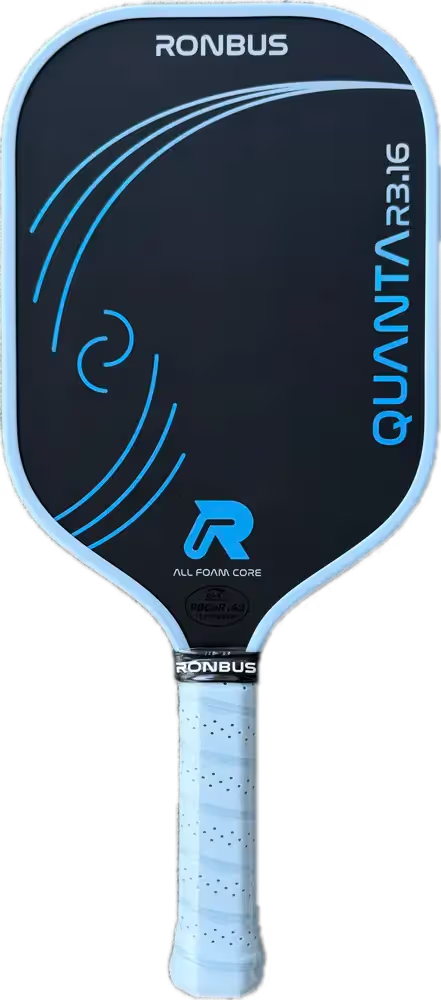
- Control
Best for strategic players who favor precision and placement over power, excelling in slow play and careful ball manipulation. - All-Court
Designed for versatile players who want the best of both worlds. These paddles balance control, power, and speed, adaptable to various playing styles. - Power
Ideal for aggressive players (aka, "bangers") who prioritize fast, powerful gameplay, sacrificing some control and sweet spot size for maximum force.
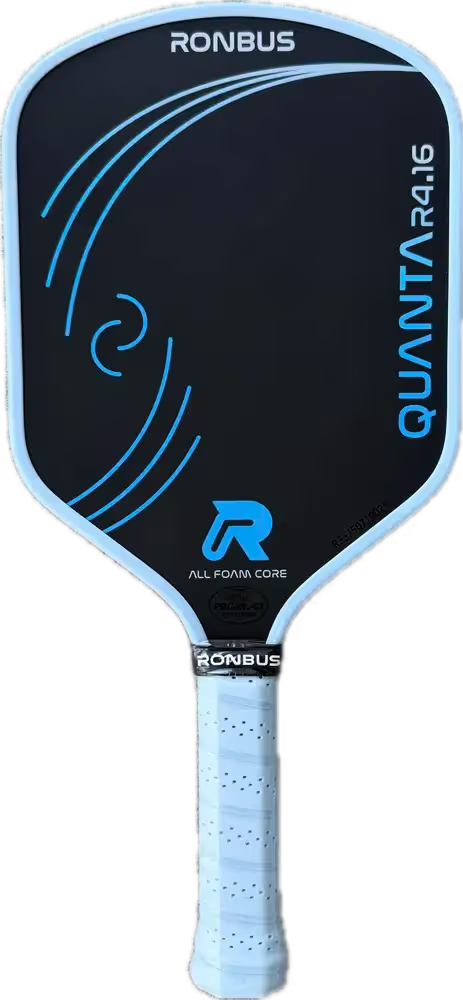
- Control
Best for strategic players who favor precision and placement over power, excelling in slow play and careful ball manipulation. - All-Court
Designed for versatile players who want the best of both worlds. These paddles balance control, power, and speed, adaptable to various playing styles. - Power
Ideal for aggressive players (aka, "bangers") who prioritize fast, powerful gameplay, sacrificing some control and sweet spot size for maximum force.
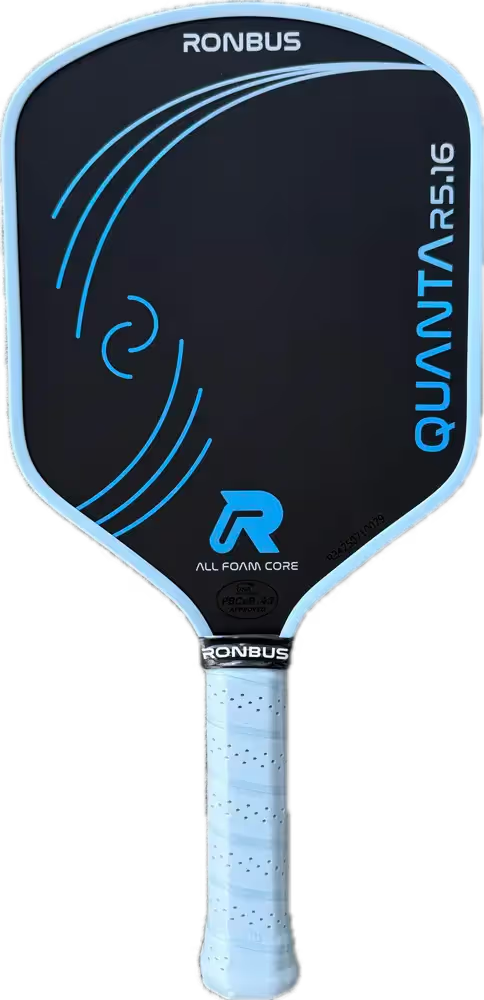
- Control
Best for strategic players who favor precision and placement over power, excelling in slow play and careful ball manipulation. - All-Court
Designed for versatile players who want the best of both worlds. These paddles balance control, power, and speed, adaptable to various playing styles. - Power
Ideal for aggressive players (aka, "bangers") who prioritize fast, powerful gameplay, sacrificing some control and sweet spot size for maximum force.






...
Playtest
Extensive testing with all five shapes both stock and with various weight configurations reveals dramatic performance differences based on customization. The transformation with added weight fundamentally changes how these paddles play.
Stock performance on serves and big swings produces pace but with thin, hollow feel. Contact creates a higher-pitched thud, and while the ball jumps off the face quickly, it doesn't drive through the court like heavier paddles. The light swing weight enables fast head speed but doesn't always deliver full energy transfer.
Adding 15 grams strategically placed at 3 and 9 o'clock positions changes everything. The hollow thud transforms into a deeper sound similar to the Selkirk Boomstik. Power jumps significantly, with side-by-side comparisons putting weighted Quantas very close to Boomstik territory for baseline pace. These are paddles costing $200 less performing within touching distance of the $300 power standard.
The coarse peel-ply texture grabs the ball effectively, creating noticeable bite that helps with topspin and backspin shots. You can feel the ball dig into the surface on drives, making it easier to swing through cleanly and generate the spin numbers these paddles are capable of.
Control and touch shots show the most dramatic stock versus weighted difference. Unweighted, the edge drop-off is harsh—miss the center on resets or drops, and shots feel dead and uncontrollable. The combination of low twist weight and light overall mass means off-center hits twist the paddle and kill ball speed unpredictably.
With weight added, the usable sweet spot expands dramatically. Added mass provides more consistent energy transfer across a larger face area, making resets and pace control much more reliable. Even weighted, these don't achieve the plush, forgiving feel of some premium foam paddles, maintaining a relatively firm sensation, but control becomes very manageable with proper weighting.
The light swing weights excel during fast volleys and hand battles. All five shapes whip through exchanges with minimal effort. Stock paddles show some vibration on hard blocks, but the TPE throat inserts provide noticeable dampening compared to other lightweight paddles. Stability on volleys improves dramatically with weight—stock paddles twist noticeably on off-center blocks, but weighted versions hold their line much better.
The most effective weight approach uses 1 gram per inch tape starting on the Ronbus logo on paddle sides, extending toward the head about 7.5 inches. Starting with 7-8 grams per side creates MOI-style weighting that increases twist weight for stability, adds swing weight for power and plow-through, and shifts feel to more substance without making the paddle unwieldy.
The magic happens with this customization. Stock paddles feel unforgiving and unstable on off-center hits, requiring modification work to reach full potential. Even weighted, they lack the premium plush feel of top-tier foam paddles. But add tungsten tape properly, and they transform into stable, powerful paddles comparable to options costing 2-3 times as much.
Shape Comparisons
Ronbus offers five distinct head shapes in the Quanta line, with choice coming down to playing style and preference priorities.
For reach and court coverage, the elongated options provide the most real estate. The R1 features a curved top edge but runs head-heavy, which can feel harder to manage in fast exchanges. The R3 with its square head design proves stronger of the two elongated options. The longer face extends the usable sweet spot and provides more reach while playing more balanced than the R1.
Maximum forgiveness and speed come from the widebody options. Both R2 and R5 offer nearly identical performance with the lowest swing weights in the line. The R2 uses traditional rounded shaping while the R5 has tapered lower corners. Playing differences are minimal, so choice comes down to aesthetics. Both provide excellent forgiveness in the widebody format.
The hybrid R4 splits the difference and has become a top choice among players testing this collection. It offers balanced proportions with ample handle space while maintaining excellent maneuverability and better twist resistance than the elongated options.
For players torn between options, start with the R4 for versatility, or consider the R2 or R5 for their lighter weight and fast maneuverability. All five shapes benefit equally from weight customization, so choice really comes down to prioritizing reach, forgiveness, or balanced performance.
The R3 and R4 shapes stand out as particularly well-balanced options for most players once properly weighted, offering the best combination of power potential and manageable handling characteristics.
Recommendations
The Quanta line targets players who don't mind customizing their equipment. Power players seeking Boomstik-level performance without the $333 price tag will find about 95% of it here for one-third the cost. Tinkerers and gear heads are right at home, as few paddles respond to added weight and fine-tuning as dramatically as these.
Budget-minded players will find the value hard to ignore. At $99 with code MPB, you're getting true power-paddle performance. The light swing weights make them especially appealing for juniors and smaller players, and even after weighting, they remain among the quickest paddles in the power category.
The Quanta series isn't for everyone. Out of the box, they can feel harsh and unstable, and even tuned they don't reach the plush, forgiving feel of top-tier foam paddles. If you already own and love a recent premium foam model, you don't need to switch—the Quanta story is about value and customization, not reinvention.
Players who want plug-and-play premium performance out of the box should look elsewhere. These paddles require modification work to reach their full potential, which isn't appealing to everyone. But for players willing to spend $20 on tungsten tape and thirty minutes setting it up, you end up with $200-level paddle performance for around $120 total investment.
The most frequent comparison during testing was to the Selkirk Boomstik, and it's accurate. Weighted Quantas produce remarkably similar power and sound characteristics to the Boomstik while costing $233 less. The Boomstik still edges out the Quanta slightly for peak power and has better stock playability, but the gap narrows significantly with proper Quanta weighting.
Price and Value
The Quanta line retails at $119, but code MPB drops the price to $99. At that price point, they sit against entry-level foam and mid-tier honeycomb paddles, yet once tuned they play in the same lane as models costing nearly twice as much.
For players willing to customize, the value proposition is exceptional. Add $20 in tungsten tape and thirty minutes of setup time, and you end up with legitimate power paddle performance for around $120 total investment. Compare that to $300+ for premium foam power paddles, and the savings become compelling.
The customization requirement isn't for everyone, but the reward is significant. These paddles deliver premium performance at budget pricing, assuming you're willing to tinker. For budget-minded players who don't mind modification work, it's hard to find better value in the current market.
If you want immediate premium performance out of the box, you'll need to spend more. But for players who enjoy optimizing their equipment and appreciate exceptional value, the Quanta series offers legitimate power paddle performance at a price point that makes premium technology accessible.
Conclusion
The Ronbus Quanta series delivers legitimate power paddle performance at budget pricing, assuming you're willing to customize. These aren't plug-and-play premium paddles, but they're exceptional value that rewards tinkering and modification work.
Once properly weighted to your preferences, the Quantas punch well above their price point, earning those budget Boomstik comparisons from extensive testing. The R3 and R4 shapes stand out as particularly well-balanced options for most players seeking the best combination of power potential and manageable handling characteristics.
The construction quality feels legitimate throughout, and the performance potential with proper setup rivals equipment costing three times as much. For players willing to spend $99 and a roll of tungsten tape to match a $333 Boomstik's performance, the value proposition is compelling.
The question becomes whether you're willing to tinker for that kind of value or prefer paying more for out-of-the-box performance. For players who enjoy optimizing their equipment and appreciate exceptional value, the Quanta series represents one of the best power paddle values available in 2025.
Code MPB drops any Quanta shape to $99 at ronbus.com. For more detailed paddle breakdowns and performance analysis, subscribe to the newsletter and follow along on YouTube for the latest reviews and testing updates.
Discount Code
Similar Paddles
.webp)
.webp)
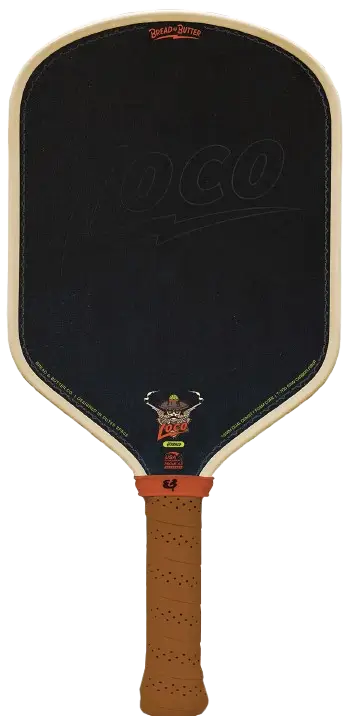
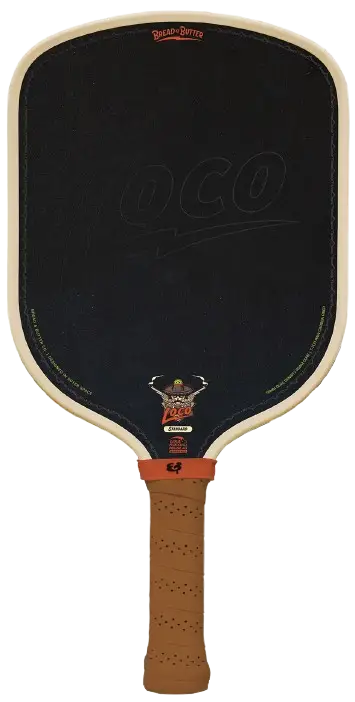
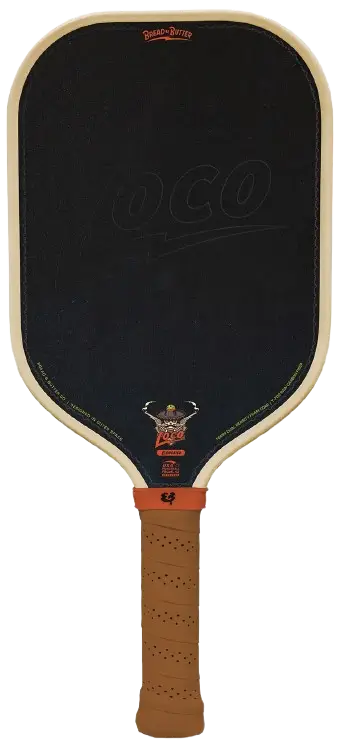
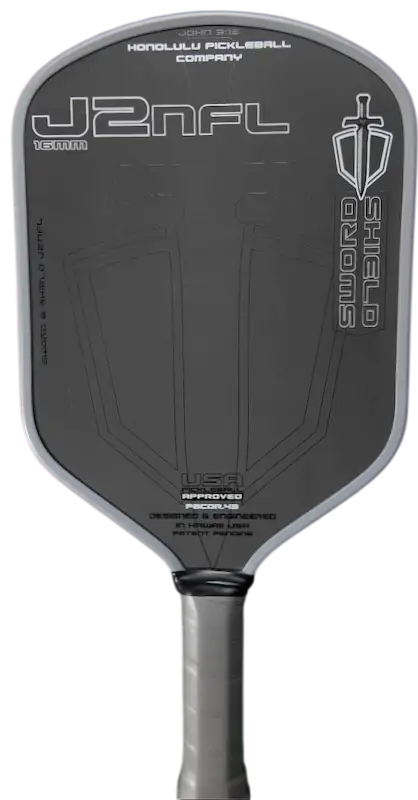


%20(1100%20x%20220%20px)%20(1000%20x%20300%20px)%20(1).webp)











